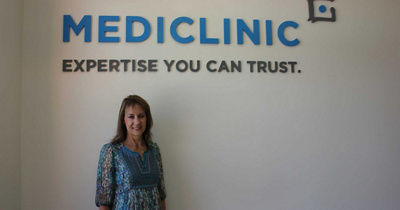As a pandemic of epic proportions, COVID-19 has taken the world by storm. Countries around the world facing a series of challenges as they attempt to curb the spread of the virus.

Not a day goes by without information being shared about the novel coronavirus. Whether it is the latest stats or some wonder cure, people around the world are facing an onslaught of information. But just how much of this information is actually true?
Separating fact from fiction, Dr Regina Hurley, the chair of the Mediclinic Newcastle COVID-19 task team, sheds some light on the matter.
What new developments have been made in terms of COVID-19 research?
Dr Hurley explains that extensive research has gone into COVID-19 and recent developments show that COVID-19 is primary a lung disease with vascular complications as a part of its presentation and progression, which affects multiple organs of the body.
As the virus spreads, Dr Hurley emphasises that one of the biggest issues linked to COVID-19 is the stigma linked to those who test positive.
“Misinformation and rumours spread more quickly than the virus. This leads to discrimination and stigmatisation of positive patients. COVID-19 is similar to the common flu. Anyone can acquire this disease at any time.”
She also emphasises that if an individual does test positive for COVID-19, it is important to highlight it is not because they did anything wrong.
“This pandemic has become an “infodemic”,” Dr Hurley says.
With much ado being made about COVID-19, what was once considered to be true and now isn’t true anymore?
According to Dr Hurley, the reliability of the tests results falls into this category. False negative results are possible with the current PCR testing. However, false positives are very unlikely.
“This is very confusing for patients. Sometimes, we must rely on the symptoms more than the test results,” Dr Hurley explains.
What is one of the biggest misconceptions about COVID-19?
One of the biggest misconceptions around COVID-19, is that too many people believe they will die if they acquire the disease. Dr Hurley explains that 80% of positive patients will be asymptomatic and may not even realise they have COVID-19. Only 15% of patients may require hospitalisation, while only 5% will require critical care or ICU.
Another common misconception is that people will get the virus if they visit the hospital or their doctor.
“Hospitals and doctors’ rooms are very safe. All patients and staff are required to use protective equipment, social distancing is being enforced, additional cleaning is being performed, staff are screened daily and patients are being tested to ensure proper placement in the hospital,” says Dr Hurley.
She emphasises that Mediclinic Newcastle is taking all necessary precautions to protect both the patients and staff.
With a great deal of fear surrounding the pandemic, is the virus as deadly as many would like to make out?
Dr Hurley says it is absolutely not as deadly as some make it out to be. Currently, the South African death rate of positive cases is only 2456 since the beginning of the pandemic.
Dr Hurley adds it is also not as deadly as other diseases such as tuberculosis, where she says the death rate stands at 330 deaths a day.
Are asymptomatic patients just as contagious as those who show symptoms? Or is this yet another rumour surrounding the coronavirus?
Dr Hurley explains asymptomatic patients are contagious, which is why it is important to follow the necessary regulations and safety measures. These are measures which we are now familiar with. The measures are social distancing, the wearing of face masks and washing one’s hands on a regular basis.
There is a certain degree of speculation about the seriousness of COVID-19 in Newcastle. But, just how bad is the pandemic in Newcastle?
Dr Hurley explains the pandemic in Newcastle is not very serious. “The Amajuba District has reported 131 confirmed positive cases and one death. We just need to adopt the protective measures to prevent acquiring COVID-19,” she explains.
In the terms of treatment, Dr Hurley explains that dexamethasone has been supported as a form of treatment. Therefore, Mediclinic Newcastle uses dexamethasone, as the Ministerial Advisory Committee of South Africa supports the use of dexamethasone in COVID-19 patients requiring oxygen.
“No further research is required before use, mostly because dexamethasone is a common medication which has been used by doctors for years and has very few negative effects.”
Furthermore, medical staff avoid ventilators as the first line of treatment where possible. Currently, the use of anticoagulation is being reviewed as treatment options, Dr Hurley explains.
As Dr Hurley clears the air around COVID-19, she offers advice to the community in order to protect the vulnerable amongst us.
“Young, healthy people should do the shopping for the elderly or high-risk people with multiple diseases. Request telephone/telemedicine consults from your doctor if you are feeling sick, rather than going to the surgery. Your medical aid will pay for this consult,” Dr Hurley explains.
While the coronavirus is a cause of concern, As Dr Hurley clears the air, we see it is not necessarily a death sentence and there is hope. However, ensure you practice the necessary measures to protect yourself and your loved ones.
